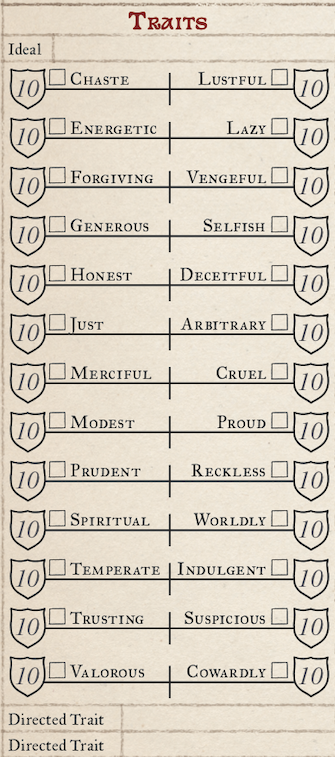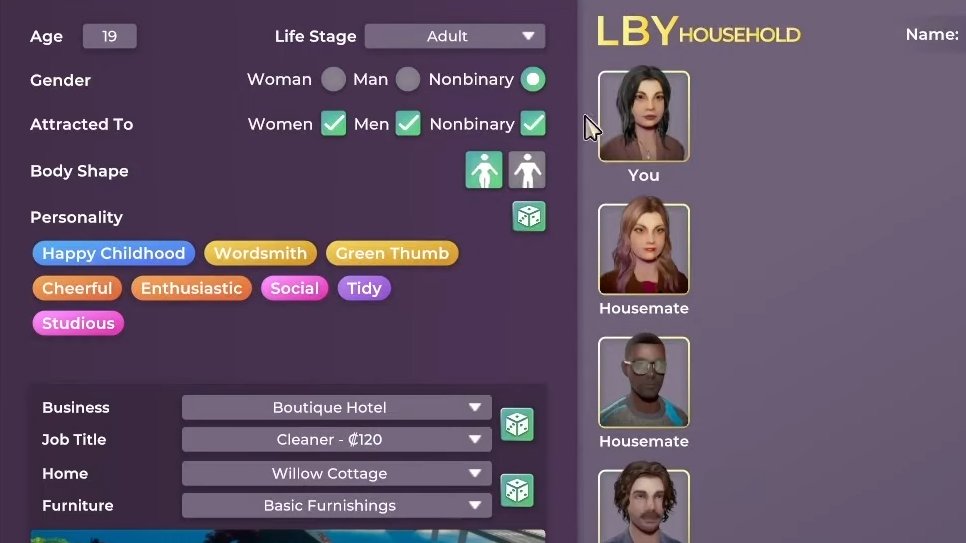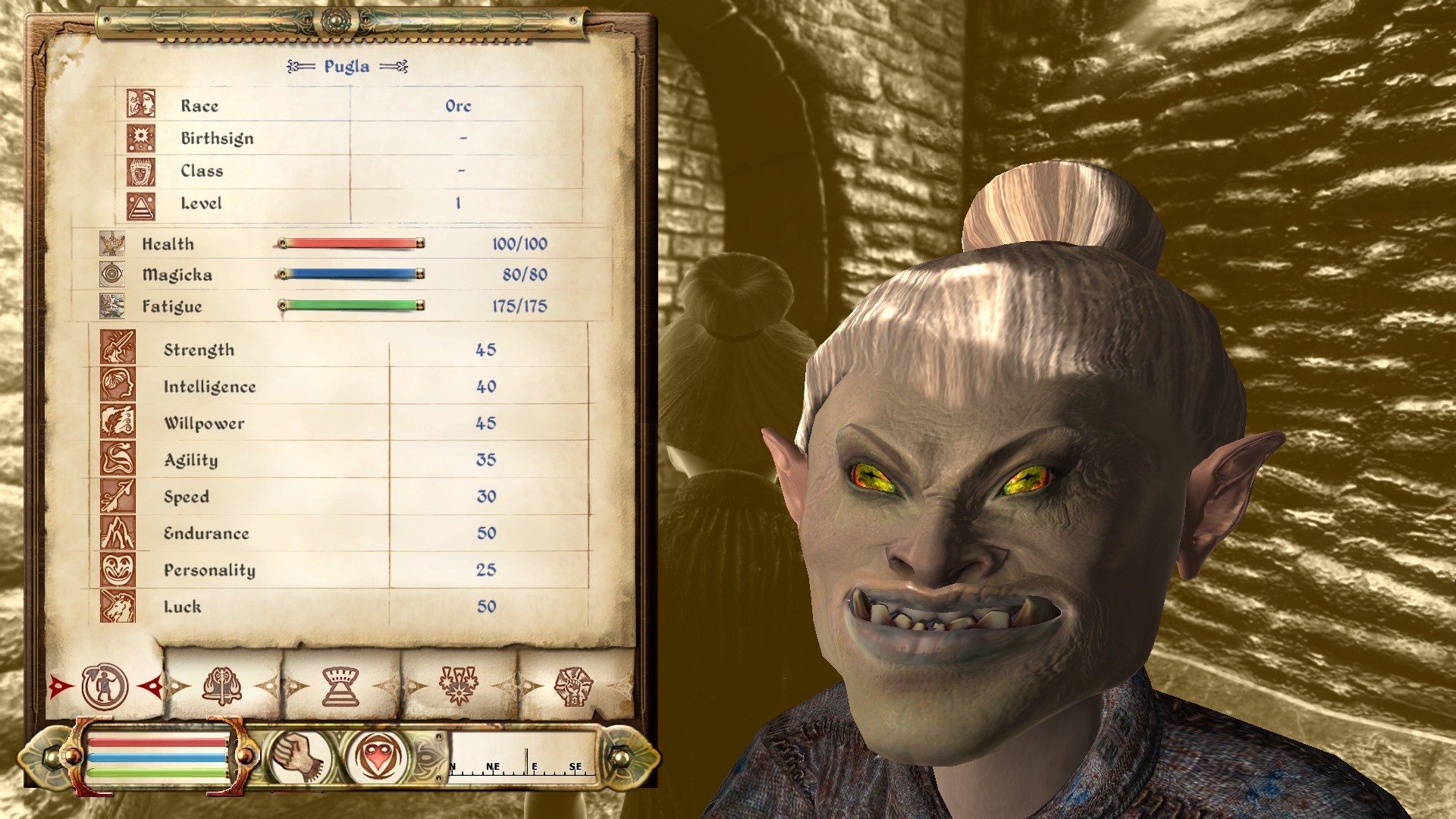Last, but not least, we're onto character creation.
In my previous entry, the focus was on worldbuilding and how that worldbuilding informs player choice, so continuing on that track, this time I'm going to focus on how character building informs player choice.
Blog the Sixth, In Which I Gush About Pendragon Again
We've talked about Personality points in The Sims 1 and 2 before. The push-and-pull of Messy vs. Slob, Outgoing vs. Shy, Nice vs. Mean.
These are, in broad terms, similar to how Traits are handled in Pendragon:
If one Trait is Unsung, then their opposite Trait is always Famous. For example, an Unsung level of Modesty might be 3; this means that that knight has a Famous level of Pride--17.
Likewise, a Normal trait, let's say Spiritual 11, is not especially noteworthy, and neither is their Worldly 9--also considered "Normal".
Trait Rolls are sometimes called for in Pendragon; to do this, you want to roll equal to or under the Trait's value on a d20. The 6th Edition Core Rulebook uses the example of trying to avoid getting drunk at a party (now if that's not suitable for a life sim RPG I dunno what is!), so let's say the GM says "roll for Temperate".
Now, our knight, Sir Osis, has a Temperate Trait of only 2, and an Indulgent Trait of 18. They have only a 10% chance, as they need either a natural 1 or a 2 to succeed; a 2 would be a critical success (as they exactly met the target value), while a 1 would be a normal success.
And they get.... a 3.
They've exceeded their Temperance, and so they drink too much, embarrassing themselves and their liege lord. How terrible! This is considered a failed roll in the Pendragon system--a roll of 20 would be even worse: a "fumble", which in other games might be called a critical failure.
Honestly, I could talk about Pendragon all day. If you're as interested as I am, check out the quickstart rules, available for free on Chaosium's website. It's a very cool game, and a great alternative to what we usually think of as "medieval fantasy" ala D&D or Pathfinder. It's got dragons, it's got magic, it's got knights from the realm of Faerie--you could very easily use the rules for any fantasy world, really, though the default setting is King Arthur's Britain.
Plus, the rulebooks look like medieval manuscripts (by which I of course mean full of doodles added by bored monks)! Absolutely gorgeous.
Yeah, Yeah... Get on With It!
Ah. Right. Where were we?
Getting back on track, it's easy to see how this kind of personality system can inform your choices as a player, and how those in turn inform the consequences the game system dishes out. An Indulgent player character is going to want to indulge; they can certainly try to temper those urges, but they're not going to succeed often.
The recent Discworld TTRPG by Modiphius (on Kickstarter as of the time of writing) does something really interesting that more closely matches the trait system seen in The Sims 3 and 4. Instead of Attributes and Skills tied to numerical values, you're given Traits.
But the interesting thing about Discworld Traits, is that they're completely rule-less. Instead of the game telling you what the Traits do, the player decides. In Discworld, Traits are simply short, descriptive sentences, and you're encouraged to twist the meaning of those sentences with wordplay, puns, and good, old-fashioned rules lawyering. Everything on your character sheet is a Trait in Discworld.
The character sheet in question.
For example: Moist von Lipwig is a travelling conman-turned civil servant. That's a Trait (his Background, specifically). How does it work? You could say, for example, he can con the villain into giving up a priceless McGuffin. Or you could say the travelling part is important in this situation, and he knows all the best shortcuts to get from Ankh-Morpork to Lancre. You decide in the moment how you're going to justify your Trait, and then the GM decides what dice you'll roll, making the check easier or harder as a result.
So.... how does The Sims use this kind of Trait system?
Being a video game, these Traits also affect the Sims' AI and the types of interactions they prefer engaging in, but for the most part, they are still player-defined. A Family-Oriented Sim might want to have kids, but it's up to you, the player, to decide what that means. Do they stop at one? Two? Do they go full trashy reality show and max out the game's Sim limit with two parents and six kids? Do you move those kids out and have six more? Do you do the 100 Baby Challenge?
Or are they content having one kid who does well in school, gets a good job, and starts a family of their own?
The Sims 4 is largely the same, except they shipped originally with only three Traits. But the game as it exists today also has Likes and Dislikes, Turn-Ons and Turn-Offs, of which you can pick dozens.
Does it make for a more human Sim? I'm not sure. I think you need a limit on these things.
The ill-fated Life By You, from Paradox Interactive, did something similar, what they termed "Personality". Personalities were Traits, in the form of text which informed your roleplaying choices and guided the game's AI into preferring certain activities and interactions (in theory, the game was cancelled in Early Access before its in-game decision-making got particularly complex).
A whopping eight Traits in the below screenshot, too--and there was no limit in LBY! That was their whole thing, a sandbox without limits. I wasn't so much a fan of that idea, to be honest. I like a bit of friction in my games. Choices, I feel, are more meaningful if choosing one means I miss out on another.
But, alas, LBY was cancelled a few months back, so my criticisms of it aren't really needed anymore. But, it gives me an example of what I don't want to do. I don't want a character creation system where you can add unlimited Traits--and that's a useful data point to have!
I also don't think I want a Trait system at all--or rather, I don't want a solely Trait-based character creation system. I love Personality points in the Pendragon style, where your character's personality is a push-and-pull of opposing values, but I think there's merit in some Traits.
It's just a matter of using those Traits in a way that feels meaningful, and doesn't conflict with the Personality/Attribute system.
Fashion Choices in an Imagination-Based Game
In the Sims series, the vast, vast, VAST majority of character creation options come in the form of outfit and hairstyle choices... at least, for feminine-presenting Sims. Masculine options have always been rather slim pickings.
By Cartoons Hate Her! on Instagram
There's this common attitude in the Sims community where male Sims are generally seen as an afterthought. Whenever you go onto a Sims subreddit or browse Twitter, or watch a Let's Play on Youtube or Twitch, you're mostly gonna see people favouring femininine-presenting Sims. Not always, of course, but often enough that you notice.
The theory goes that because EA (the Sims publisher) makes extensive use of telemetry data (that is, every choice you make results in a bit of data that they collect, and then they analyse those player choices and make design decisions accordingly), that they see that most Simmers tend to make feminine-presenting Sims, and so EA primarily creates content for feminine-presenting Sims.
This creates a feedback loop where people don't make masculine-presenting Sims because there simply aren't enough worthwhile (and most importantly, new) clothing items for them, so this means that making feminine Sims is more fun, because there's more stuff to do with them. Sure, you CAN buck gender norms and make a dude with acrylic nails, false eyelashes, and perfectly-contoured makeup. Of course you can! But that's not really the issue at hand.
We could spend twenty blog entries going on about how toxic masculinity harms men and how gender exists on a wide spectrum, but that'll have to wait for another time. I see you, I hear you, and I honestly agree with you. Fuck gender! Putting people into neat little boxes, when nature is itself not binary and never has been, helps nobody.
But I'd like to make a dude that looks like me (a cisgender thirty-something with too many vintage rock band tees), and The Sims 4 has some absolutely atrocious ideas about what masculine fashion looks like.
Now... in an RPG, how would I accomplish a clothing system? Games like D&D have an equipment system--armour, weapons, and the like, but that's easier to handle in a medieval world where there's only so many types of armour to choose from, and where customisation largely comes in the form of enchantments. That is, magic armour.
Magic clothes don't really fit the vibe of "a game set in real life" that I'm going for, and a limited selection of clothes is going to fall prey to the very same problem that life sim video games fall into, where I can't account for everybody's personal sense of style, and the clothes that shipped in 2014 are extremely dated in 2024. I mean the base game Sims 4 options were never great, but they were at least somewhat timely at launch.
Variety is the spice of life, and there's countless styles of clothing, makeup, and hair in the world, and fashion is always changing. So how do I represent that? Well... Traits, actually.
I think what I'd want to do, is have a limited selection of Traits defined by the player during character creation, done in the Discworld style. Instead of buying armour, I'd have a blank space labelled "Sense of Style", and allow the player to fill it in however they wish.
In true Sims fashion (pun intended), I could even have multiple blank spots. Casual Style, Work Style, Formal Style, Hot Weather Style, Cold Weather Style, and so on. Maybe... three or four? We don't want too many.
This would be pretty much future-proof, as you could play this game in any year and be able to include a style that's of the times. If I had equippable items, like "Y2K Aesthetic" or "Rock Band Shirt", you'd be stuck playing a fashion-forward Zoomer (or, if you're still playing in the year 2045, a Zoomer who's severely out of touch) or a Millennial who's really into vintage rock 'n' roll. It's too limiting.
The same goes for physical features. A spot for people to insert a picture would be handy, but also, what about a "Noteworthy Feature" slot? The sort of thing people would mention, if for example, they were making a witness statement to the police, or filing a missing person's report. You might not immediately clock that somebody has green eyes, but you might clock that they've got a big ole butt. 🍑🍑🍑🍑
I might get "Nerdy-Ass Tattoos" as a Noteworthy Feature. This would allow a player character with that Trait to have an easier time interacting with, for example, other tattooed people or folks with an interest in some aspect of nerd culture, but might conversely have a harder time dealing with conservative authority figures, who assume everybody with tattoos is on drugs.
Or, there could be a "Tall" Trait, meaning that if a PC was doing something in cramped conditions, they might be at a disadvantage, being more likely to bump their head, but an easier time reaching high objects.
And... yeah. Somebody with a large caboose might have an easier time interacting with people who are into large cabooses (cabeese?).
Look, this is..... uh.......... not without precedent.
I cannot lie; the people love big butts. They yearn for them.
Let's go to the other extreme. Perhaps your character is unimaginably ugly? This is another extremely popular thing to do with character creation systems in video games. Now, why would anybody want to do this?
Well, because they're memorable. You see this face, and it's gonna haunt your dreams from now until the end of your days.
So, there's another Noteworthy Feature we could use. "Incredibly Ugly". We don't need to know every single physical detail about our characters, let's just pick the things that stick out the most, and the things that most NPCs are going to react to.
So, that's character creation. A set of Attributes (our Personality points) and a couple of Traits (Sense of Style and a Noteworthy Feature). We can add to this, of course, but I think it's a really good starting point.
Next time, on Nobody Poops on Television: putting all of this into practice!









Comments
Post a Comment